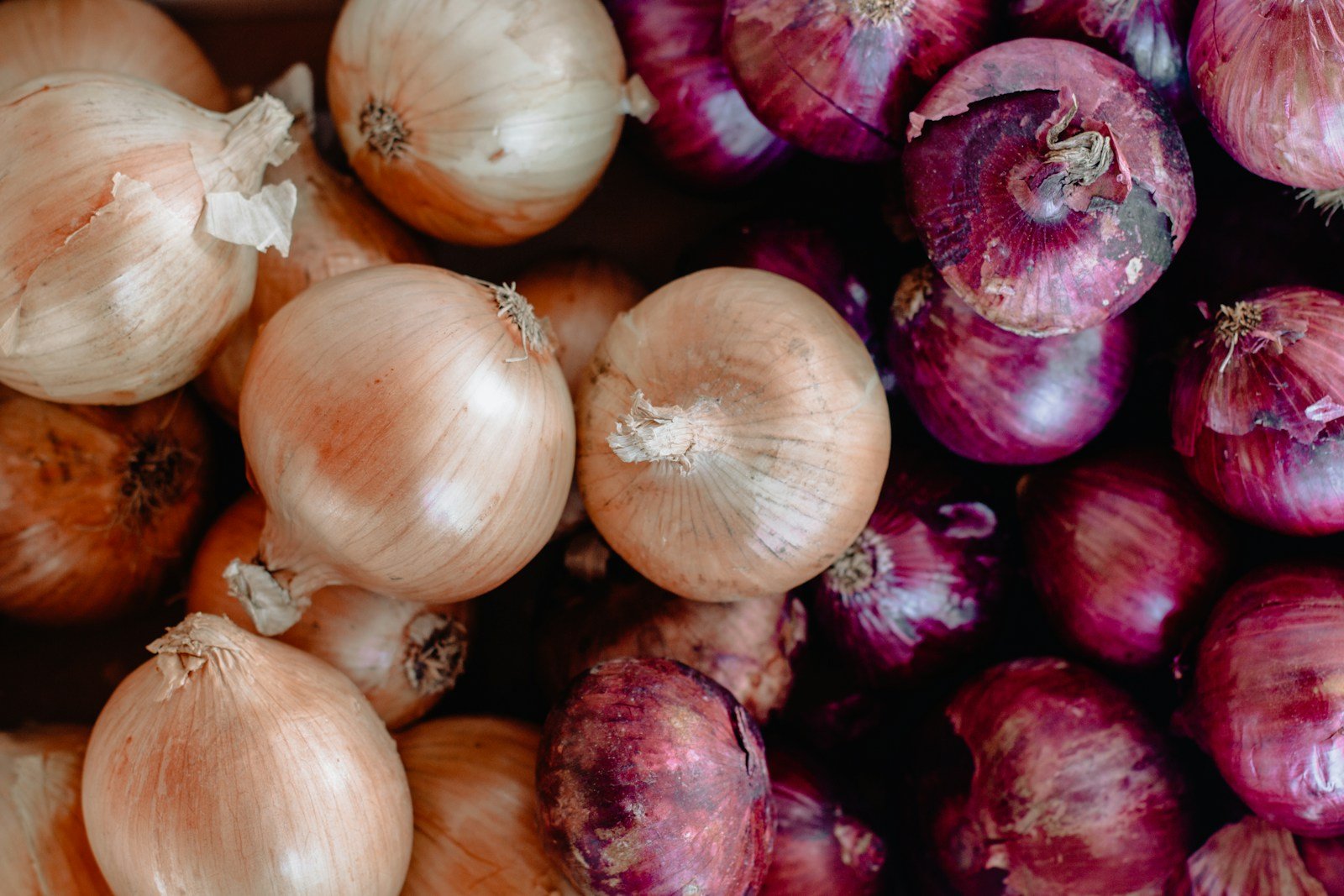Table of Contents
- Nutritional Profile of Onions
- Onions and Cancer Prevention
- Onions for Heart Health
- Onions and Diabetes Management
- Onions for Bone Health
- Onions and their Antimicrobial Properties
- Additional Benefits of Onions
- Additional Resources and Further Reading
- Practical Tips and Actionable Advice
- Conclusion
Introduction
Onions are a staple ingredient in kitchens around the world, known for their pungent aroma and ability to add depth of flavor to dishes. However, these humble bulbs offer far more than just their culinary appeal. Packed with essential nutrients and potent plant compounds, onions have been cherished for their medicinal properties since ancient times.
According to the Food and Agriculture Organization (FAO), onions are the second most widely cultivated vegetable globally, with a production of over 98 million tons in 2019. This widespread popularity is not just due to their versatility in cooking but also their numerous health benefits that have been backed by scientific research.
Nutritional Profile of Onions
Despite their modest appearance, onions are a nutrient-dense food source. They are rich in vitamins C, B6, and K, as well as minerals like manganese, copper, and potassium. Onions also contain a variety of beneficial plant compounds, including flavonoids, polyphenols, and organosulfur compounds.
One of the most notable compounds found in onions is quercetin, a powerful antioxidant that has been linked to various health benefits, including reduced inflammation and improved cardiovascular health.
Onions and Cancer Prevention
Numerous studies have suggested that onions may play a role in cancer prevention due to their rich array of antioxidants and sulfur-containing compounds. These compounds have been found to induce apoptosis (programmed cell death) in cancer cells and inhibit tumor growth and metastasis.
A review published in the Journal of Nutrition and Cancer highlighted the potential anti-cancer effects of onions against various types of cancer, including breast, colon, and prostate cancer. The researchers attributed these benefits to the presence of organosulfur compounds like allicin and diallyl disulfide.
Onions for Heart Health
Onions are widely recognized for their potential to support cardiovascular health. Several studies have demonstrated that regular consumption of onions may help lower blood pressure, improve cholesterol levels, and reduce the risk of heart disease.
A study published in the British Journal of Nutrition found that individuals who consumed a diet rich in onions and other allium vegetables had significantly lower levels of low-density lipoprotein (LDL) cholesterol, also known as “bad” cholesterol.
Onions and Diabetes Management
Emerging research suggests that onions may play a role in managing diabetes and its associated complications. A study published in the Journal of Functional Foods found that consuming onion extract improved blood sugar control and reduced oxidative stress in individuals with type 2 diabetes.
Additionally, onions are low in calories and high in fiber, making them a suitable addition to a diabetic diet. The fiber content in onions can help regulate blood sugar levels and promote feelings of fullness, potentially aiding in weight management.
Onions for Bone Health
Onions are a rich source of gamma-glutamyl peptides, which have been shown to enhance the absorption of calcium and promote bone health. A study published in the Journal of Clinical Biochemistry and Nutrition found that consuming onion extract improved bone mineral density and bone strength in menopausal women.
Furthermore, the high vitamin K content in onions may also contribute to better bone health by supporting the production of proteins involved in bone metabolism.
Onions and their Antimicrobial Properties
Onions have long been recognized for their antimicrobial properties, which can be attributed to their sulfur-containing compounds, such as allicin. These compounds have been found to exhibit antibacterial, antifungal, and antiviral activities, making onions a potential natural alternative for fighting various infections.
A study published in the Journal of Food Science and Technology demonstrated the effectiveness of onion extract against several strains of bacteria, including Staphylococcus aureus and Escherichia coli.

Additional Benefits of Onions
Beyond the benefits mentioned above, onions have been associated with several other potential health advantages:
- Anti-inflammatory properties: Onions contain compounds like quercetin and allicin, which have been shown to reduce inflammation in the body, potentially benefiting conditions like arthritis and asthma.
- Digestive health: The fiber and prebiotic content in onions can support a healthy gut microbiome and promote regular bowel movements.
- Skin health: The antioxidants and anti-inflammatory compounds in onions may help protect the skin from damage and improve overall skin health.
Additional Resources and Further Reading
If you’d like to learn more about the benefits of onions and their potential applications, here are some additional resources:
- Books:
- “The Onion Book: The Ultimate Guide to Cooking with Onions” by Mark Beach and Karen Gillingham
- “The World’s Healthiest Foods” by George Mateljan
- Articles:
- Health Benefits of Onions: An Overview
- Onions: Health Benefits, Nutrients, Preparation, and Tips
- Websites:
- National Onion Association
- World’s Healthiest Foods: Onions
- Research Studies:
- Anti-Cancer Properties of Onions: A Review
- Effects of Onion Extract on Bone Mineral Density in Menopausal Women
Practical Tips and Actionable Advice
Here are some practical tips and actionable advice for incorporating more onions into your diet and maximizing their health benefits:
- Choose the Right Type: Different types of onions offer varying levels of beneficial compounds. Red and yellow onions tend to be richer in antioxidants like quercetin, while shallots and green onions (scallions) are higher in sulfur-containing compounds like allicin.
- Proper Storage: Store onions in a cool, dry, and well-ventilated place to prolong their shelf life and preserve their nutrient content.
- Cooking Methods: To maximize the bioavailability of beneficial compounds, consider consuming onions raw or lightly cooked. Overcooking can diminish their nutritional value.
- Incorporate Onions into Your Meals: Add onions to salads, soups, stews, stir-fries, and other dishes to boost their nutritional profile. Experiment with different varieties and flavors to keep your meals interesting.
- Onion Juice or Supplements: For those who prefer a more concentrated form, consider juicing onions or taking onion supplements (consult with a healthcare professional first).
- Manage Potential Side Effects: Some individuals may experience gastrointestinal discomfort or heartburn when consuming large amounts of onions. If this occurs, reduce your intake or consider taking a digestive enzyme supplement.
- Combine with Other Healthy Foods: While onions offer numerous health benefits, a balanced diet that includes a variety of fruits, vegetables, lean proteins, and whole grains is essential for overall well-being.
Conclusion
Onions are more than just a flavorful addition to our meals; they are a powerhouse of nutrients and bioactive compounds with numerous potential health benefits. From cancer prevention and heart health to diabetes management and antimicrobial properties, these humble bulbs have earned their place as a superfood.
By incorporating onions into your diet in various forms and preparation methods, you can harness their remarkable benefits and support your overall well-being. Remember, moderation is key, and a balanced diet rich in a variety of whole, nutrient-dense foods is essential for optimal health.
So, the next time you slice into an onion, take a moment to appreciate the incredible power packed within its layers. Embrace the pungent aroma and let it serve as a reminder of the countless benefits these humble bulbs offer.
Are you ready to unleash the potential of onions and experience their remarkable health-promoting properties? Start by incorporating them into your meals today and embark on a journey towards a healthier, more vibrant you!


Leave a Reply